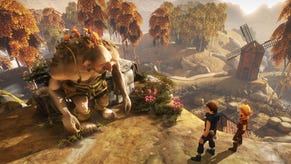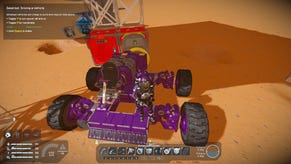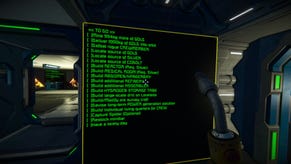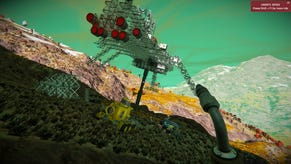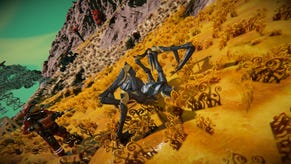How to turn (almost) any game into an RPG in 5 easy steps
In space, no one can hear you dig a giant hole
Everyone loves a good RPG right? Compelling dialogue, interesting choices, the gradual accumulation of power to defeat a big baddie. Problem is proper, deep ones take years to make and are becoming rarer all the time. So what’s the solution? Simple: hack other games into being RPGs!
I’m not talking about modding, or other feats of technological wizardry. I'm taking about shoe-horning an RPG into existing games in the name of fun, with just your imagination. I recently put this into practise as the Game Master, ODD the robot, on the adventures of the Wastes Of Space. I helped some of RPS's staffers have some ridiculous space RPG shenanigans, in a sandbox game about physics and engineering. And you can make your own fun just like this! How you may ask? Well, with these five surprisingly detailed steps.
1. Choose your game
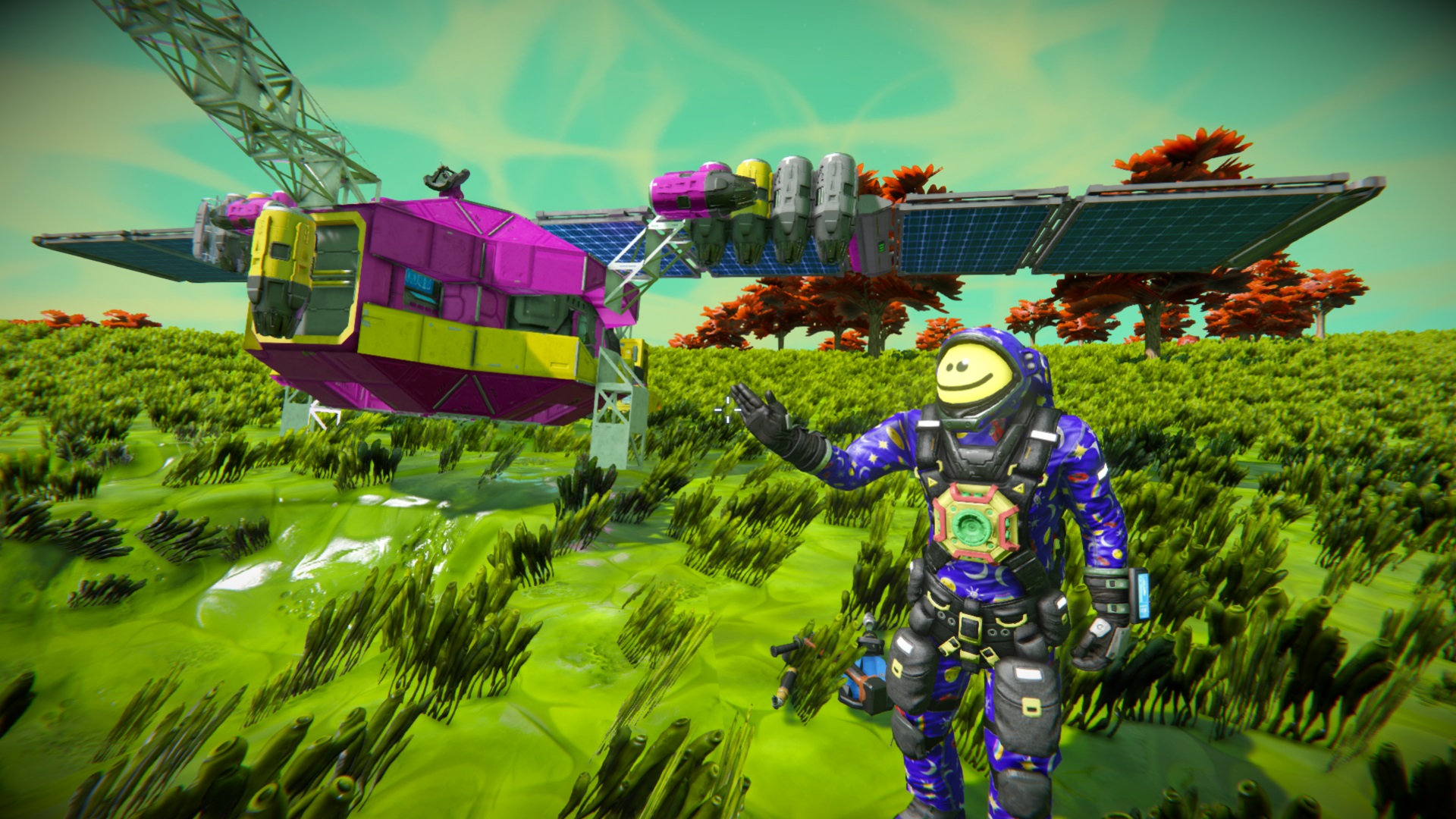
Multiplayer is probably the key thing here. If the game doesn’t have other people in it, it’s hard to play a role (although not impossible, of course). Apart from that, you can roleplay in almost any genre of game you like, but some are easier than others.
While you might be tempted to jump to something incongruous, having a story that ties in neatly with the setting can be helpful, especially for newer roleplayers. Pretending to be army men in an army men game is obviously easier to grasp for some people. Do a good shoot, army man!
Think about what could be possible within the game. I’m not saying it’s impossible to make an RPG work in more restrictive games, but that if you want to run a tight murder mystery weekend then maybe avoid FIFA 2017. Gary’s Mod is a good place to start for a lot of potential themes, because it’s already deeply weird in the best possible way.
Generally speaking, Sandbox games like Minecraft also lend themselves well to roleplay because they're already designed to let you do thing at your own pace, which means you can ignore the plot in the game and do something entirely different.
Most of all, lean into what a game provides. That might be a 3D world, procedurally generated things to explore, or perhaps a ridiculous physics engine. Doing this will free up the GM from answering questions from a giggling group of players about what happens if they, guffaw, drop a carrot in a toilet!, and instead lets the GM focus on the important stuff. A plot that the players will ignore to do something else entirely, for example.
2. Figure out what sort of RPG experience you're after
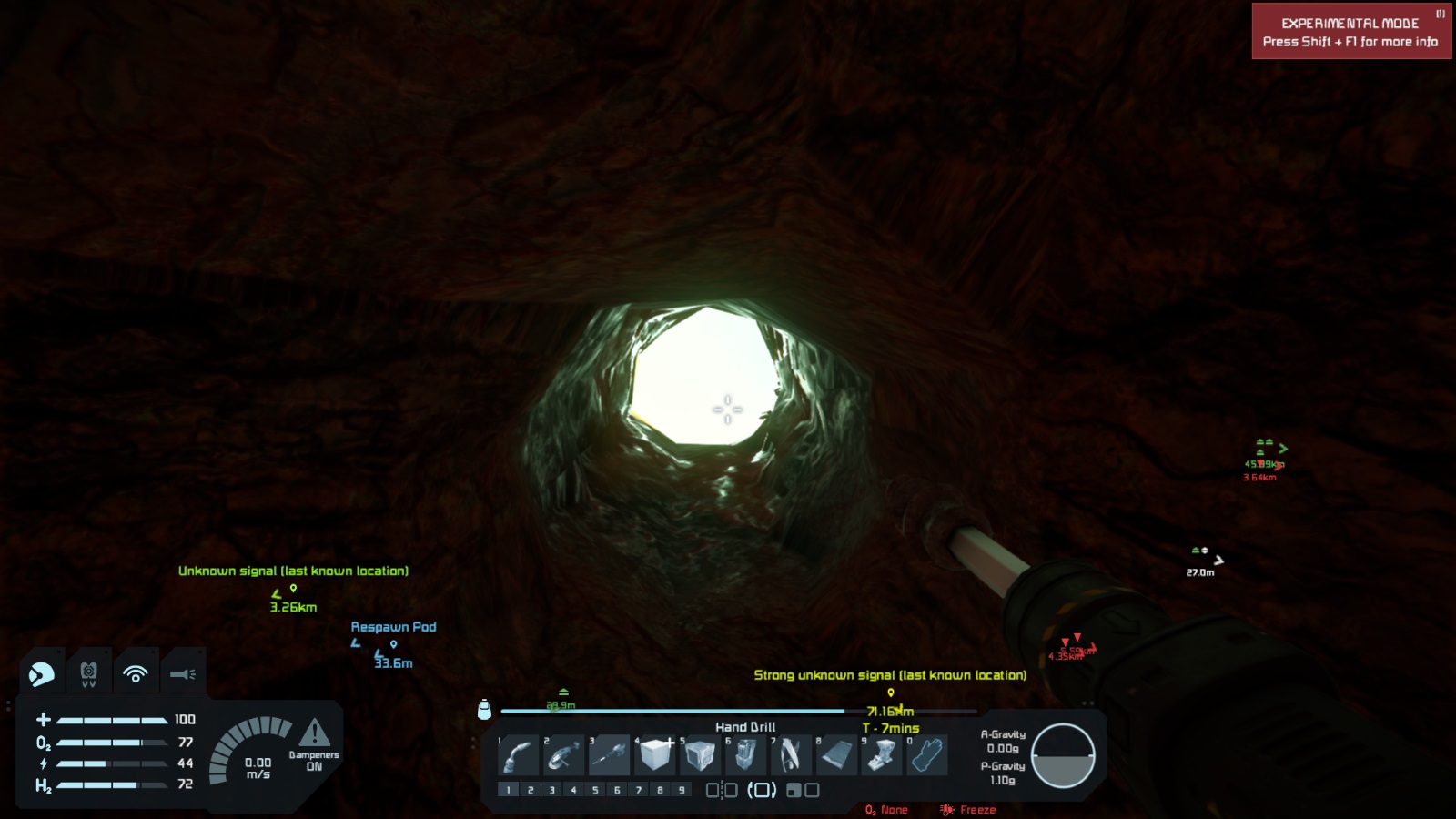
Before we started on the Space Engineers adventure, I made up jobs for the crew (with colours for the uniforms) and told them to pick their own roles. This had, and I cannot stress this enough, zero effect in game, but it helped everyone get into the right mind-set. I think this was probably the most successful part of the whole endeavour.
The actual mission was total mayhem, with the crew sabotaging and self-sabotaging like characters from badly written 80s TV sci-fi, and so that is what the game became focused on.
A big part of being a games master is building intricate puzzles for friends and then being constantly surprised by how they react to them. Our playthrough of Space Engineers was like playing Rimworld with a busted mouse and keyboard running out of battery.
I’d gently herd the crew towards their goal while they cackled and attacked each other with drills or dug a series of holes making their home base into a death-trap. Along the way I helped the team create incredible machines and then watched as they were inevitably and almost immediately destroyed.
The fun in running an RPG in something is a chance to actually roleplay in a game. No dialogue trees here, or friendship stats. It’s improv, but where no one is stuck being the audience. But still, the best improvs do work with a framework. Wacky, high concept space betrayals might not be for you, so figure out what is. High fantasy? Low fantasy? Middle fantasy? The options are endless!
Also, get some rules ahead on pronouns and things people don't want to encounter or deal with. Do that last bit in a private email so no-one feels pressured. It’s 2019, and we can do better.
3. Planning and preparation

It’s a good idea work out some notes in advance for your adventure. It could be a scrawled on a notepad or a branching story on an excel spreadsheet, but either way it’s helpful to have your thoughts set out before you begin. There isn’t a GM alive who hasn’t rolled a dice or shuffled some paper to buy time while they think of what's going to happen next.
But no matter the format, do keep the rough shape of it loose. The players aren't going to do exactly what you expect, or even a little bit what you expect, and that’s part of the fun. (Remind yourself it is part of the fun when they stampede over your intricately constructed plot hook on their way to dig more holes.)
For Wastes Of Space, the crew had to get 1000kg of gold in space, in seven days. I chose this because if Space Engineers is about anything it’s about building machines to do things (see points 1 and 2). This task would require building a surveying machine to find the gold ore, a mining machine to dig it up and process it, and third machine to get it into space. The time limit was to drive things forward and keep the players vaguely on task.
How the crew designed or built the necessary machines them was entirely up to them. I didn’t know if they would work together, or against each other. Or what sort of machines they would build. There is no way when I put the adventure together that I could have predicted that the players would make a giant spider base in tribute to one of Will Smith’s weakest films.
This raises a good point though. It is useful to think of the plot for your adventure like a film. The basic premise should be able to be explained in a single breath. Maybe it's 'find the hidden treasure', good simple one, that. Or maybe you plop your players into a Minecraft server where every three days something comes and takes a villager. A trail of body parts suggests a beast, but exploring the dark caves to the north hints at something more sinister and organised. Could the villagers be involved? Or even a player…?
Yes, always consider treachery. If one of the players is secretly against the team, it can add an extra spice to everything. The potential for double crossing being acknowledged from the outset means one player is unlikely to end up being the boss with the rest simply following orders. It's an ace to keep up your sleeves at all times, if the game suits.
The downside to all this is that sometimes people have enough stress in their lives that they might want the game to be an escape from all that. I can’t be the only person still haunted by the choices Dragon Age: Inquisition makes you decide early on (especially if you are a city elf, am I right?). To get ahead of this, get an email chain going so people know their roles and the game-world. This email chain can also keep the plot going in between adventures, especially if you struggle to get everyone in a game at the same time. A special Discord server is also good for this, especially since you can have custom names to keep it all in character.
You should also allow extra time in the first session for people finding their feet - ranging from learning how to play a new game to deciding who their characters actually are. This will save time in future sessions, and help the players relax and get familiar with the role playing.
You also need to think what the GM’s role in this is going to be. An invisible observer behind the scenes? Playing the role of minor characters using costume changes? Costumes really help, actually. It’s amazing how easy it is to accept that this is actually a different gravedigger from the next village because she’s dressed differently.
If you are going to play along with the players, how will you stop yourself from solving the problem instantly? You should know that this option will get harder as you play, when after weeks of trying to solve something, no one in the party has thought to read an explanatory letter that was given to them on day one.
4) Mods, tools, and props
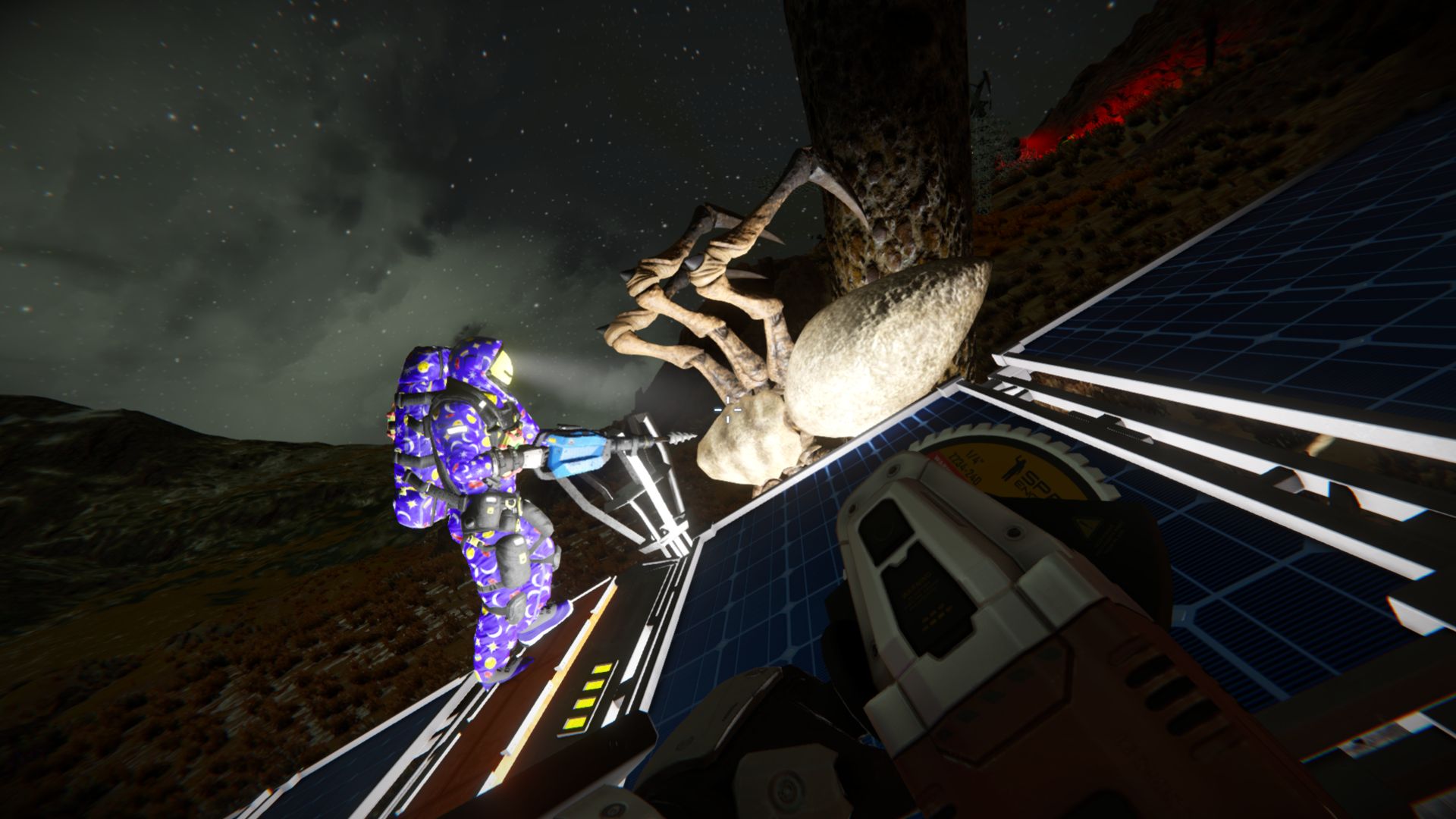
If you're trying to do something weird in a game, odds are that someone has not only already done it, but has also written a guide on how to do it on a forum from 2007. It probably hasn’t been updated since then, but it might help you get the thing you want into a game engine without having to write any code.
For example, I wanted to put some JPEGs in to Wastes of Space for the players to see, but the game doesn’t support it. Some genius, however, had worked out a way to modify text and then display the text on screens, so if you set the resolution in just the right way the image would appear made out of letters. These pictures were a low resolution and coloured like a wonky early 90s game with EGA graphics, but it felt like magic.
As a general note, sounds really don’t get enough respect for setting the mood in games and films. They can do so much heavy lifting if used in the right way. Remember the baddie in Jaws for the first half of the film is just two notes. I made use of Voicemod.com, which is free and incredibly useful for altering voice if you aren’t great at accents. It also can do pre-loaded sound effects on keypresses, so you can throw in a dun-dun-duuuuuuuuuuuh! when something mysterious happens. The website TabletopAudio.com is brilliant for generic background music for a range of settings, and don't forget FantasyNameGenerators.com for creating a bunch of names quickly.
I also used audio samples (helpfully provided by pals - modern gaming headsets are pretty good for recording whatever you need) to provide some key voices, like the ships computer. I'm not saying you have to record a different person for every sinister innkeeper that appears, but a few choice moments can be really lifted by the sound of an unexpected voice.
5) Be prepared for players to break everything

I have said this throughout this article, but it bears repeating. To quote the famous Prussian General, Helmuth Karl Bernhard Graf von Moltke, "No plan of operations extends with any certainty beyond the first contact with the main hostile force." Or put another way, your players may say they want to explore cyberpunk dungeons in Minecraft, but they will probably get distracted by setting up a fish and chip shop outside the entrance. You are going to have to adapt.
It helps to think of plot elements as separate blocks - almost self-contained – rather than long chains. This means you can change or move one without affecting the others too much, and move on when the players are done with something rather than trying to force them too hard into a specific direction.
These self-contained ‘blocks’ of plot can also be put together in advance, and you’ll never know where you might be able to use them. They are also useful if you have a session where some of the players can’t make it and you need to do a bottle episode. On Wastes OF Space, we had a session with only two players (Science and Security, aka Matt and Nate), so their challenge for that episode was to design a vehicle each and then have a race - with the winning vehicle forming the design for a larger machine. We just explained away the other players not being there by saying they were asleep. They really enjoyed it and it worked really well - and they forgot about the winning prize stipulation as soon as the work on a giant spider began.
But while story blocks are the best approach, they also mean that there will be stuff you make that players will never see, and you have to accept that. I set up ‘Reclaimation Sharks’ by mentioning them loads in my in character company emails from Brent. They were going to be the final boss of the adventure. I got a Norwegian pal (thanks Neil) to record the voice parts for when they arrived. They're absolutely bristling with guns so would have been a fearsome enemy, unless a plucky group of colonists could notice that the engines were extremely visible and a few lucky shots could cause it to come tumbling out of the sky...
...but scheduling issues caused them to stay machines of legend only. But making them was entertaining in itself, and I’m sure I’ll get to use them in some future adventure. Waste not, want not, as the ancient GM saying goes.
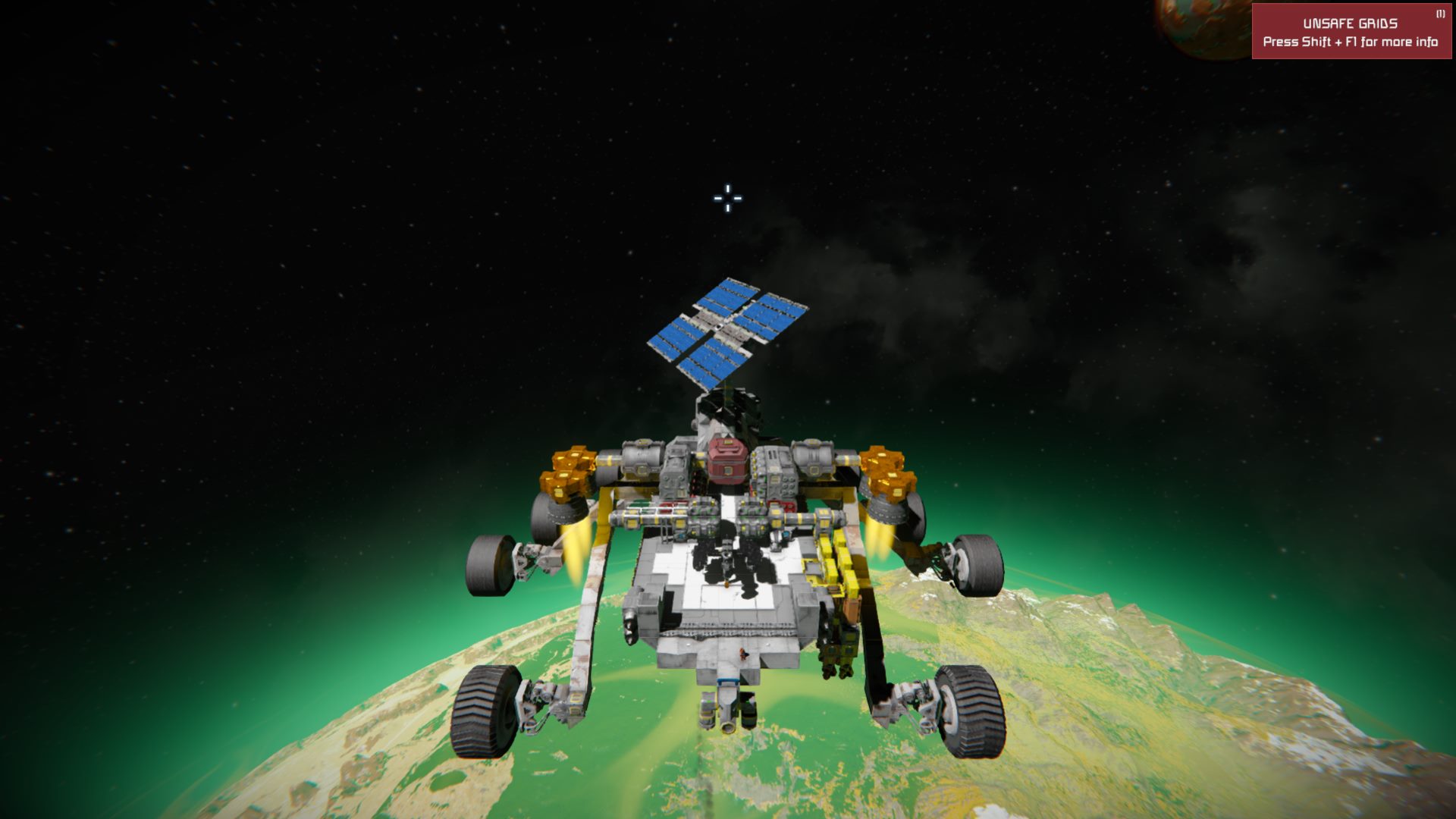
Of course this sort of thing is fine, because I could never have planned the incredible ending that came about through the players' own actions. The Loveless drifting through space, fully powered but unable to slow down because the hydrogen was all spent, and the metals required to make an ION engine were stolen. Two of the crew plummeting towards the earth, trying to kill each other. The last sane human alive - our Commander - returning to her quarters for hyper sleep, with instructions only to be woken up if the ship was ‘lucky’ enough to hit an asteroid. It was an outstanding ending. One of my all-time favourite gaming moments. And perhaps if you look out of your window on a dark, clear night you might be lucky enough to see a 1.5 million tonne robotic spider twinkling as it hurtles across the sky.
If you see it, hum this ancient tune in memory of the brave crew who perished to get it there.
As one final note, if you fancy exploring the Loveless and have Space Engineers I’ve uploaded the ship here so you can have a wander around. But fair warning, Security says he will duff up anyone who uses his toilet.




